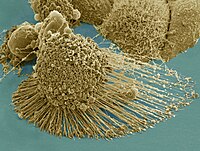
Photo from wikipedia
Summary Cellular senescence is characterized as a stable proliferation arrest that can be triggered by multiple stresses. Most knowledge about senescent cells is obtained from studies in primary cells. However,… Click to show full abstract
Summary Cellular senescence is characterized as a stable proliferation arrest that can be triggered by multiple stresses. Most knowledge about senescent cells is obtained from studies in primary cells. However, senescence features may be different in cancer cells, since the pathways that are involved in senescence induction are often deregulated in cancer. We report here a comprehensive analysis of the transcriptome and senolytic responses in a panel of 13 cancer cell lines rendered senescent by two distinct compounds. We show that in cancer cells, the response to senolytic agents and the composition of the senescence-associated secretory phenotype are more influenced by the cell of origin than by the senescence trigger. Using machine learning, we establish the SENCAN gene expression classifier for the detection of senescence in cancer cell samples. The expression profiles and senescence classifier are available as an interactive online Cancer SENESCopedia.
Journal Title: Cell Reports
Year Published: 2021
Link to full text (if available)
Share on Social Media: Sign Up to like & get
recommendations!